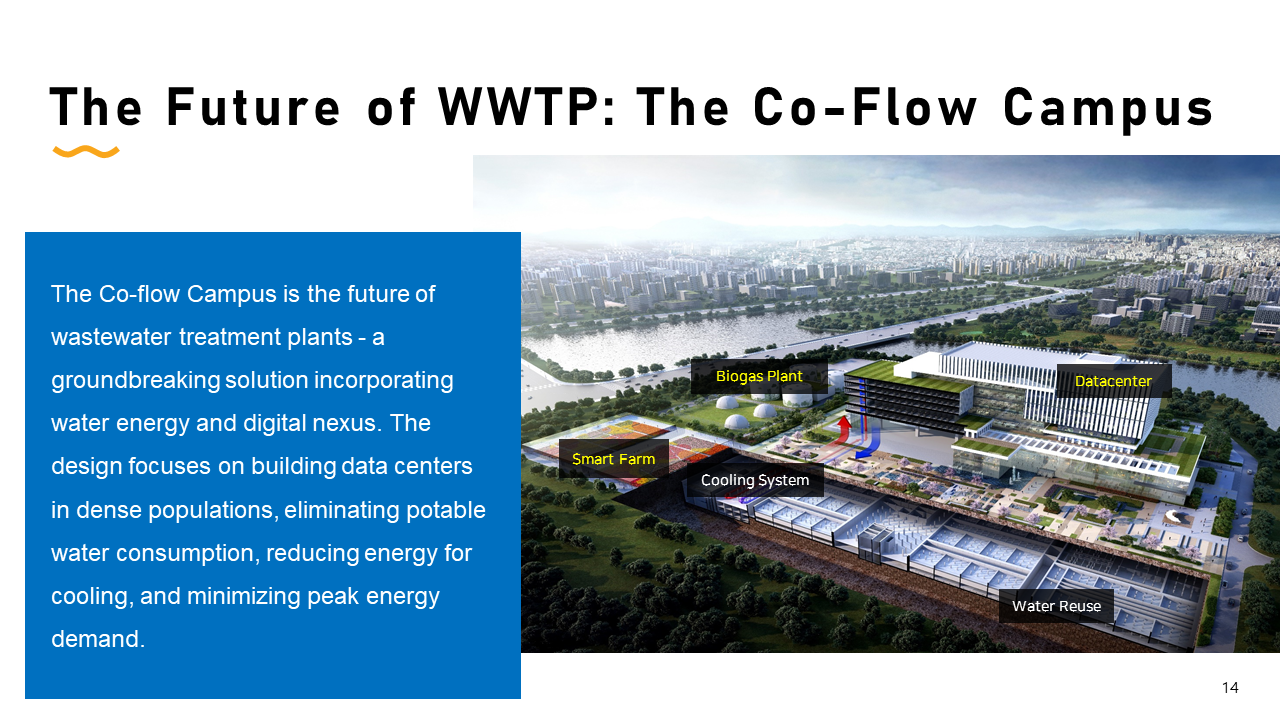Progress report for
BKT Tomorrow Water Project

Achievement at a glance
The beginning of 2020 marked the completion of TWP 1.0 (2016 - 2020), a stage dedicated to the development of unit technologies. The progression into TWP 2.0 (2021-2025) marks a year defined by the consolidation of our foundational technologies through contracted projects alongside the progression into the digital innovation space.<Process Design Process>
Downstream:
• The Noksan project(700㎥/d) awarded in 2019 is on track to finish TWP’s first sidestream AMX(Anammox process) project in 2023. Furthermore, the city of Kimhae has signed a MOU to implement a pilot of the sidestream AMX.
• Our innovative process of combining Proteus technology and mainstream AMX, which enables the treating time to be under 3 hours, is undergoing rapid progression as mentioned in the 2020 progress report. This year, the MS AMX pilot was successfully operated in Hyperion.
• Following a successful test of both Proteus and Proteus+ at the Milwaukee Metropolitan Sewerage District (MMSD), preparations for a demo plant are underway.
Upstream:
• In Milyang, the upstream co-digestion project with AAD has been completed. Results marked another milestone for TWP’s unit technology, which showed 30% more biogas production compared to conventional anaerobic digestion technologies.
<DIGITAL FORMATION>
• Answering to the digital age, Co-Flow has become an idea supported by both Arcadis and Samsung in the form of MOU’s. A feasibility study with Arcadis was conducted to scope out Co-Flow’s practical application in a future where data centered infrastructure becomes integral. For further development, BKT’s WAI-Design Draco, our own thermal hydrolysis process, basic version was completed.
Challenges faced in implementation
Entering the latter half of TWP 2.0 and preparing for TWP 3.0 has not so much introduced new challenges but rather the need to begin addressing them. With the complex integrations of different technology to create the final product we desire; Co-Flow has always required a sophisticated understanding of conceptual design and incorporation. The challenges arise from the new combination of concepts that require cooperations between all departments ranging from the research and development teams to legal counseling. Co-Flow will come at a time when both public and private sectors must be willing to work with one another, which raises the issue of having proper industry regulations and policies in mind. With the information age and the topic of information ethics ranging from government access to data protection to individual privacy laws, Co-Flow must be able to untangle the issues that surround such sophisticated systems.Next Steps
1) Developing New IdeasTWP has always been a concept with overarching themes that become adaptable to whatever environment necessary. In keeping its core principles and ideas together, the application of alternative technologies highlights one of the distinguishing features of the project. Our next vision looks forward to entering the future of agriculture through smart farms that would be implemented into the TWP. Defining the new industry norms is central to the TWP’s values of creating a sustainable future for Tomorrow.
2) R&D Completion
With what began as a wide-ranging concept, TWP will look to complete central R&D projects that will be reactionary to the needs of a sustainable and technology defined future.
Our new contributions to the TWP unit technologies introduced an aerobic granular sludge (AGS) process that began a pilot operation in Daegu as well as an oxygenic photo-granule (OPG) process piloting in Daejeon. These pilots display the wide simulations TWP is preparing to integrate adaptable practices in any environment.
3) Funding for demonstration in advancing countries
Alongside ideas, there will always be a need for funding. By focusing on finding potential investors or funding to demonstrate in advancing countries, the true strengths of the TWP will come. In lieu of expensive treatment options, TWP stays grounded in its mission to supply a sustainable future for all groups demanding the proper sanitation they deserve. Not only did we look to provide a technologically advanced method of doing so, but we looked to create one efficiently utilizing the investments.
4) Marketing
To find funding, we need to let people know we are here. In introducing the world to TWP and the benefits we bring through the integration of our systems, we hope to find an audience that understands the value of cleaner water, air, and land.
Beneficiaries
We were awarded a consulting contract with a local government in Vietnam regarding a feasibility study of co-digestion of livestock wastes and organic wastes. The contract serves as a testament to the TWP ideology of creating an advanced society through the guidance of advancing countries. The advantages of the TWP do not need to be secluded to those of P15 nations looking to jump ahead of the curve - it can be applied to a broader audience. In our previous report we stated that TWP is targeting “not just the environmental needs, but the economic needs as well”, and we look to move beyond that statement. Now we can state we are growing to serve the demand for societies to skip the developing stage to be on par with the developed.
Actions
• Recognizable Awards Included;: Shortlisted for GWI Water Technology Company of the Year
: Awarded by Ministry of SMEs (Small and Medium Enterprises) and Startups, S.Korea
: Selected CEO of BKT Korea as civil committee member to the Presidential Water Commission, S.Korea
: Awarded the Global Sustainable Leader 100, 4 years in a row from Association for Supporting the SDGs for the UN(ASD)
• The BKT US CTO, Dr. David Rhu was featured in a headline interview with GWI, an industry leader in providing information within the water industry.
